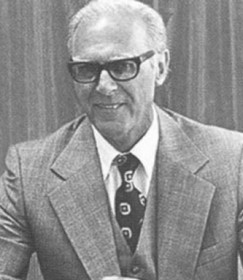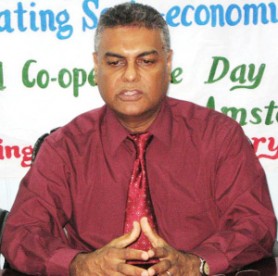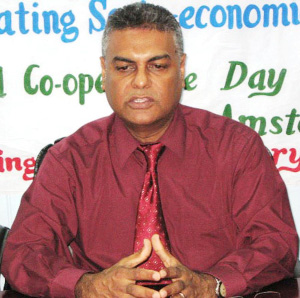The United Force will observe its 5oth anniversary in October this year
It is one of the quirks of Guyanese political history that the People’s Progressive Party, People’s National Congress and The United Force all regard the 5th of October with reverence. The PPP celebrated its victorious return to office in the general elections of 5th October 1992. The PNC, founded on 5th October 1957, celebrated its 50th anniversary back in 2007. The United Force, launched on 5th October 1960, will celebrate its 50th anniversary this year. Quite a coincidence!

Of these three dinosaurs that bestrode the political landscape in the fiery pre-Independence years, the United Force is in the greatest danger of extinction. The Party has not been able to win a single seat outright in four elections – from 1992 when it received 3,183 votes to 2006 when it received 2,694 votes or 0.8 per cent of the electorate. It was awarded a seat in the National Assembly on each occasion only through ‘left over’ votes, calculated in this country’s peculiar proportional system after other parties had earned their full quota of seats. How did a once formidable force become a farce?
Origins
The United Force set itself the mission of becoming the guardian of the conservative tradition in Guyanese politics. In the post-war era of mass party representation when working people all over the world were marching for change and colonies were clamouring for independence, there was little to be conservative about. Yet, that was the tradition that was carried on by the National Democratic Party which drew its support from the commercial élite, elements of the professional sector, Christian churches – mainly Anglican and Roman Catholic –and persons who considered themselves ‘middle class.’
The hierarchy of the NDP was always multi-racial in composition. The leaders – John Fernandes a prominent Portuguese businessman and the Party’s Chairman; Sheik Mohamed Shakoor a rich Indian businessman who was also General Secretary of the Manpower Citizens Association trade union, Lionel Luckhoo, an attorney-at-law and Eugene Correia a diamond dealer – were all regarded as well-to-do. Peter d’Aguiar, another Portuguese businessman, contested the 1953 elections, unsuccessfully, on the NDP slate. Mass support, however, was always negligible and the NDP fragmented under the pressures of the 1953-1957 constitutional crisis and political meltdown.

The United Democratic Party arose after the NDP had vanished from the landscape. It was absorbed by the People’s National Congress – established by Forbes Burnham after the 1957 general elections and after he was expelled from the PPP. The financially prosperous business section and certain labour leaders disdained to support the PNC.
It was in an attempt to construct a mass base to support an anachronistic conservative political platform that Peter d’Aguiar in 1959 led a group of Portuguese businessmen and Indian trade unionists to negotiate a strategic partnership with PNC leader Forbes Burnham. D’Aguiar’s ambition was to contest the general elections due to be held in 1961 with his money and the PNC’s masses. The negotiations collapsed and d’Aguiar launched the United Force on 5th October 1960. The main backers who attended the inauguration ceremony were Portuguese businessmen and the Indian leaders of the Manpower Citizens Association – Cleveland Charran, Richard Ishmael and Rupert Tello.
From the start, the Party’s political ideology that was enunciated by its founders and which was published as its elections manifesto – Highways to Happiness – never changed. The United Force continued to adhere to the principles of free-market economy and liberal-democratic ideals that were embedded in its Constitution and Manifesto. It was not on its ideology but on its rash marriage to the neurotic MPCA that the Party foundered.
The 1960s was the decade when demagoguery carried more weight than democracy and the mass vote was more valuable than élite support. In Guyana’s ethnic environment, it was evident by 1960 that the majority of Indians had been mobilized behind the PPP and Africans behind the PNC, both of which claimed to be socialist and to represent the interests of the working classes. It was clear, also, that the UF was supported by the Portuguese community and the social elite. But they were a relatively small section of the population.
The UF therefore did not hesitate to ‘play the race card’ like its rivals. This was backed by the Roman Catholic Church which, through its missionary work, had extensive influence among the Amerindian population in the hinterland. The Party was thus enabled to become dominant, deliberately targetting the Amerindian ethnic community, recruiting the legendary Stephen Campbell into its leadership and championing Amerindian issues. Of its four members of the Legislative Assembly in 1961, two were Amerindians – Edward ‘Teddy’ Melville of Wapishana descent and Stephen Campbell, an Arawak.
As a result of this electoral strategy, the Party was able to capture a commendable 16.3 per cent of the popular vote when it participated in the general elections of August 1961 only ten months after its founding. But thereafter, it was downhill all the way. The sources of its electoral strength brought it into conflict with the PPP which held office in 1961-1964 for several reasons. Apart from ideological differences, the UF was supported by the MPCA, the recognized union in the sugar industry that was fiercely opposed by the PPP-backed Guiana Agricultural Workers’ Union. MPCA’s President was Richard Ishmael who had also become President of the British Guiana Trades Union Council.
Conflict
The business interests of UF supporters and the labour interests of the MPCA became so entangled that they dragged both the Party and the union into mortal conflict with the PPP and the GAWU from which neither recovered. Both party and union were seriously threatened by the PPP’s fiscal policies, represented particularly by certain measures in the budget of 1962. Supported by overheated reportage of the Daily Chronicle newspaper which was owned by d’Aguiar himself and by restless workers affiliated to the BGTUC which was led by Richard Ishmael, the UF committed its resources to oppose the budget. The general strike called by the BGTUC degenerated into disorder on 16th February 1962.
The following year, the PPP administration focused its fury on the MPCA, threatening it with extinction. The Labour Relations Bill aimed at displacing the MPCA and gaining representation for GAWU in the sugar industry. The introduction of the Bill in the Legislative Assembly led to a long general strike that resulted in the Administration’s withdrawal of the Bill. But the knives were out. The next year, 1964, the GAWU-MPCA war of attrition resumed, dragging their respective sponsors – the PPP and UF – into conflict once again. GAWU called a strike for recognition in the sugar industry in February and the arson and murders started in March. This time, with political independence on the horizon, the stakes were higher. The PNC joined the UF in calling for electoral reform to resolve the worsening political crisis and getting into office.
The sheer senselessness of the violence unleashed by the GAWU strike during what came to be known as ‘The Disturbances’ and which lasted largely from February to the end of the strike in July, brought the country to the brink of civil war. Godfrey Teixeira, a 13-year-old Portuguese schoolboy was killed in March when a bomb was thrown into a sugar estate school bus on the Lusignan public road. The June massacre in Hadfield Street, Georgetown of the prominent Portuguese family – the Abrahams – some of whom were known UF supporters, was one of the most atrocious amidst a series of atrocious crimes and led directly to the detention of 32 PPP activists within 24 hours of the incident.
The GAWU strike and its associated ‘Disturbances’ forced several Portuguese families to migrate. In the general elections of December 1964 as a result, the UF’s share of the popular vote shrank to 11 per cent. The party was still strong enough to enter a coalition administration with the PNC. Relations were rocky and the coalition fell apart in 1968 by which time the PNC had enticed several senior members to quit the UF.
Already handicapped, the party suffered a crippling blow in 1969 when several of its prominent members – including Edward Melville a former member of the Legislative Assembly and Valerie Hart, its candidate in the 1968 general elections – led a rebellion in the Rupununi District. The party expelled the rebels but it never expiated the crimes. Peter d’Aguiar himself resigned the leadership in the wake of the failed rebellion and withdrew from active politics completely.
Political paralysis gripped the UF within a decade of its birth. Its founder-leader was gone, migration had haemorrhaged its membership and its reputation was badly tarnished by allegations of involvement in the Rebellion. The MPCA trade union, soon to be thrown into the dustbin of history, was being pulverized by the aggressive GAWU. The PNC administration undermined the UF’s Amerindian support by appointing its own Amerindian Minister – Philip Duncan – and embarking on an active policy of integration, education and the reallocation of lands. These measures had the effect of terminating that community’s isolation from the rest of the country and cutting off UF support at the ankles.
Challenge
After these reverses, the party’s leadership passed to Marcellus Fielden Singh, the brother of Benedict Singh, then Roman Catholic Bishop of Guyana. But by that time, the spell of religious affiliation had worn thin and, in Singh’s hands, the decline accelerated. When Singh’s health began to fail, Nadir grasped the leadership by default in 1993. He was elected formally in 1995 but inherited only a shell, bereft of money and members.
It is tempting to draw comparisons between the vibrant party that d’Aguiar built in 1960 and the wreck that remains in 2010. Comparisons between businessman Peter d’Aguiar – the party’s visionary legendary founder – and the current leader Manzoor Nadir, who serves as Minister of Labour, Human Services and Social Security in the People’s Progressive Party-Civic Administration would also be inapt. But Manzoor Nadir’s tenure has not been easy and he has had to face several challenges since seizing the leadership.
Following the 2001 general elections in which TUF secured the usual single seat in the National Assembly, the PPPC found it expedient to offer, and TUF found it rewarding to accept, a ministerial portfolio in the Administration. Manzoor Nadir said that the decision to take the job was made only after “extensive consultations” with the Party’s executive and ordinary members. He saw “no problem” with his being a minister of the administration and at the same time also being leader of an opposition party. “I am just a party leader in government, not opposition,” Nadir had told the Stabroek News newspaper at that time.
The appointment, however, was challenged in the courts. Then Chief Justice Carl Singh in his judgement – on an Originating Motion brought by an elector that cited Nadir and the Attorney General of Guyana as respondents and that sought to punish Nadir for crossing the floor and accepting the position of Minister in the PPPC Administration – ruled that Nadir had been properly a member of the National Assembly. The Chief Justice also refused a request for a declaration that the Government acted unconstitutionally and unlawfully when the President appointed Nadir as a Minister and allowed him to sit on the Government bench and to support the PPPC list of candidates in the National Assembly, inasmuch as he was at the time the representative of the United Force in the National Assembly.
Within the Party itself, diehards rained criticisms on Nadir for what they saw as his betrayal of d’Aguiar’s political objective of building a capitalist economy. Anthony Vieira, a former member, in a withering television commentary broadcast in November 2003, accused Nadir of losing almost all of the party’s traditional Amerindian support to the Guyana Action Party. Malcolm de Freitas, another member, led a mutiny that threatened to unseat Nadir for his failure to convene regular conferences and hold elections. Finally, a conference was convened under duress only after a group of ordinary members formed an action committee to force the party to do so. Since Nadir’s election, party conferences have been infrequent.
In its enfeebled state and with dwindling electoral support and dodgy reputation, TUF’s greatest threat has come mainly from Paul Hardy’s, Rupununi-based, Guyana Action Party. The PPP administration, with its limitless access to state resources and presidential patronage, outplayed the UF on its own turf by campaigning to win over the Amerindian community which it ignored in the past. The UF has become a victim of its own friendship with the PPP and its own determination not to articulate Amerindian grievances for fear of irritating the administration.
Today’s United Force seems to be neither united nor a force to reckon with. Like an automaton, it goes through the motions of participating general and regional elections, albeit with diminishing returns. It has staggered aimlessly for decades and is now about to stumble into the dustbin of history.

